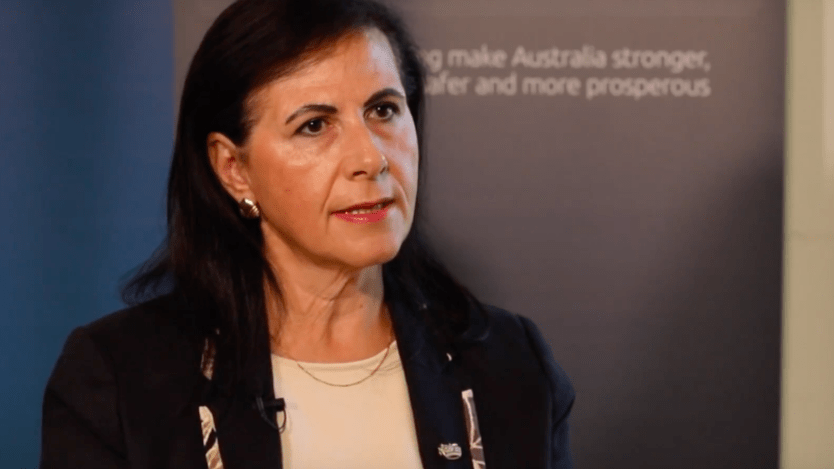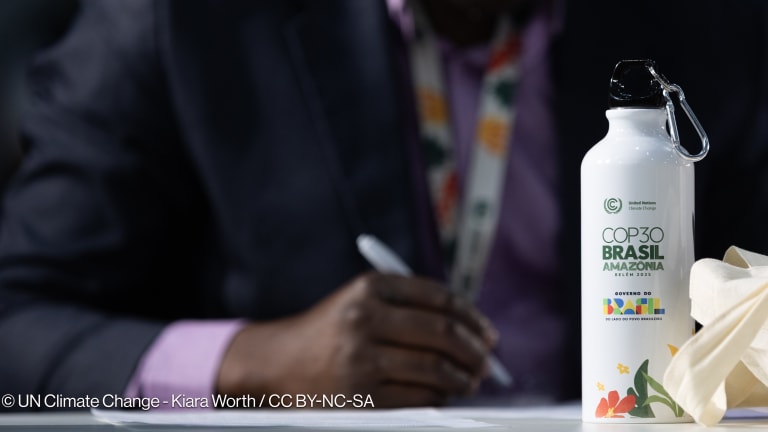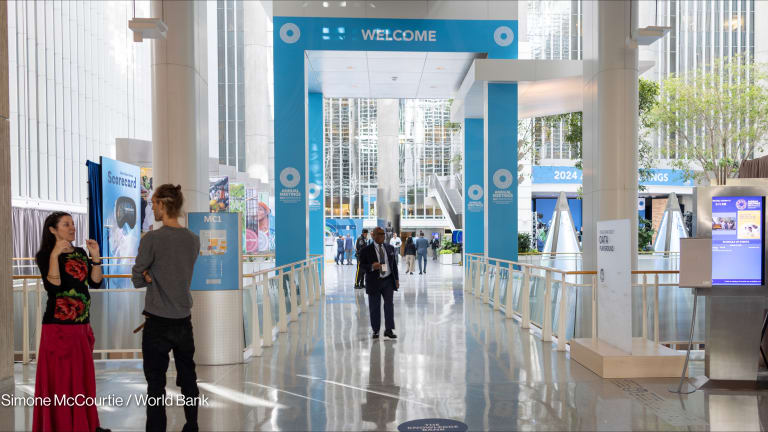AidToo, Chinese aid, and Australian politics: Q&A with Concetta Fierravanti-Wells

CANBERRA — It has been just over two years since Senator Concetta Fierravanti-Wells was appointed as Australia’s Minister for International Development and the Pacific, taking over the role from Steve Ciobo. In this time, she has travelled extensively throughout the Indo-Pacific region promoting Australia’s development and humanitarian programs, at a moment when new aid actors are emerging abroad and aid’s role is being questioned at home.
At the second annual Aid Supplier Conference in Canberra on Feb. 15, Devex sat down with Fierravanti-Wells to discuss a range of Australian aid issues, including China’s influence in the region, AidToo, and the politics of the aid program as we enter an election year.
Here is the interview, edited for length and clarity.
You have recently been vocal in criticism of Chinese aid in the Pacific. Following your comments, Dan McGarry from the Vanuatu Daily Post wrote an article on the Devpolicy Blog comparing a Chinese and Australian infrastructure projects and said China’s project was successful in opening up areas of the country while Australia’s project was shambolic.
There are always good and bad development projects but how do you take on feedback, including criticism, to improve Australia’s aid program?
Australia has a very stringent aid performance framework. It is part of a very strong overall aid program that is about $4 billion Australian dollars ($3.13 billion). Aid effectiveness and measuring the performance of aid in our overseas development program was done by an independent section of the Department [of Foreign Affairs and Trade] — so we are constantly monitoring.
Often in countries, particularly countries in the Pacific, there can be delays for various reasons. Often where projects are managed — in this case where management is by an overseas development bank we are in partnership with — by another organization and that organization has the major control over a project, it is really important to look at each project.
See more related topics:
► Takeaways from the 2018 Aid Supplier Conference
► Penny Wong on Labor vision for Australian aid
► Takeaways from the 2018 Australasian Aid Conference
► Australia has released its new foreign policy white paper — what now for NGOs?
If I could just step back from that, the importance for Australia and for other donors is to ensure that our aid is affordable, it’s realistic and it’s effective. That’s really where we are coming from, and it is important to ensure aid is productive and that it is actually assistance — it’s overseas development assistance to help countries to them move on to deliver stability, prosperity, and security.
So that’s where we’re coming from and it is important that we do not have a situation where countries are overburdened with debt. Debt sustainability is an issue that has been raised — and raised by donors and other institutions including the IMF [International Monetary Fund]. It does come down to effective, realistic, and affordable aid.
Australia does have an MOU on China development cooperation, which has led to a joint project targeting malaria in Papua New Guinea. Are there plans to utilize this MOU more to collaborate on projects in the Indo-Pacific and ensure all aid is effectively supporting the Indo-Pacific region?
We work very effectively with a range of different partners — and indeed this aid supplier conference is about partnerships. It’s about effective partnerships.
What we are finding now increasingly, particularly as the World Bank and Asian Development Bank increase their funds that are available and particularly in the Indo-Pacific area, we are probably going to see much greater diversity of partnerships.
This partnership that we have — particularly in relation to policy driven partnerships with this a health partnership — I think is very effective. We need to tackle those sort of major health issues.
This sort of policy rather than infrastructure-led investment, particularly by the banks, is most welcome. It affords countries the ability to really drive major policy issues, major things in their countries that are rife of need to their people.
The Oxfam scandal in the United Kingdom has hit the development sector hard, with DFID demanding improvement from the organization as a recipient of their funding. How can Australian aid and other donors, work to stamp out harassment and sexual abuse and create an environment that encourages people to speak up?
Australia has a very effective aid program. But we also have very strict parameters that we expect of our partners. The Australia overseas development assistance program engages with a range of partners including private sector, NGOs, and development banks.
We also have an Office of Development Effectiveness that really runs the ruler over the work that we do in the official development assistance space. And so, we expect a high standard and we’ve ensured that through our framework of analysis and evaluation, we look at how effective our ODA programs are and we ensure that we get value for money.
And as part of value for money there is a whole range of criteria that have to be considered and measured to ensure we are delivering an affordable, realistic, and effective ODA program.
#MeToo has focused on the celebrity side of challenges, but in the development and humanitarian sector the people affected by sexual harassment fear coming forward because of the risk of losing their jobs. Could the Office of Development Effectiveness act as a conduit to or assist in bringing to light barriers among partner organizations that enable harassment within Australia?
I strongly condone any such practices in our ODA. To my knowledge, I am not aware that any such practices are existing. Oxfam Australia is separate to Oxfam in Britain, and of course we have partnerships with various NGOs — those partnerships have worked well. That is not to say that there haven’t been issues that have been raised as part of the evaluation process.
But I believe that our frameworks are sufficiently robust to pick up those sort of issues. And of course we want those sort of issues raised. But to my knowledge, as I said, we don’t have those issues being raised here. We’ve certainly raised with Oxfam our concerns, and we have received assurances.
I think the framework that is in place is adequate, but of course if there are issues that are raised, we will investigate them and of course we will assure that those sort of measures and those sort of issues are not evident in any programs that are delivered through our ODA.
Last year you spoke here at the Aid Supplier Conference on your interest in doing more to support the needs of Africa, with greater engagement of diaspora communities. With Kenyan-born Senator Lucy Gichuhi recently joining the Liberal Party as a new representative, is this also a topic of interest to her and has she been able to support engaging your colleagues in the Liberal Party more on this?
It’s wonderful to have Lucy as a senator.
She is an amazing women with a very inspiring story. She and her husband came here as skilled migrants, unlike many of the people who have come here from Africa under our humanitarian program, but regardless, they all work very hard.
Last year, when I attended the African Union Summit in Addis Ababa I talked about Australia’s involvement in Africa. But of course the Australian-African community remit about AU$1 billion per annum to Africa.
Diasporas are very important.
I have strongly encouraged NGOs in particular to be more engaged in the diaspora community. There is no one more generous than a migrant who has been successful in Australian wanting to give back to his country. And so we have NGOs that operate in many countries around the world, all of whom or the majority of whom, have diasporas in Australia.
And I would like to see greater involvement by our partners with those diaspora communities, not just as potential donors but also as people who engage in a relationship with those countries, often they are the backbone of the trade and investment from Australia to those countries. So I think they have a role to play and therefore I would continue to push and encourage our partners to find linkages and opportunities to better work with those diaspora communities.
Lucy has just joined us, and I know she has particular interest in aged care and other areas, but I am sure that she will continue to engage. And certainly from my personal perspective, I have engaged with her and I look forward, if she is interested in engaging in this space, to have her very much involved.
As we are getting closer to the next election, policies parties will be taking to the voters in the next election are being discussed. At the Australasian Aid Conference, Penny Wong spoke of what and Australian Aid program for a Labor Party under the leadership of Bill Shorten will look like. What can we expect from the Coalition — will there be new funding, programs or initiatives supporting the aid program you will be taking to the voters?
In the last budget we did increase spending in our overseas development assistance. I think in the end, it’s not necessarily about quantity, it’s about quality. Our aid program is a very targeted one — it’s all about security, stability, and prosperity in our area.
I’m pleased to see that the opposition is talking now about the aid program in the context of the budget and ensuring that it is affordable.
But we have seen in the past promises made by the opposition in relation to overseas aid and then subsequently seen those promises coming to nothing. We saw major announcements on aid before we were tendering for a position on the United Nations Security Council only to see cuts to that decision.
And indeed, as a consequence of Labor’s failed border security policies, we saw AU$750 million taken out of the aid budget to pay for that, which made the Australian government one of the highest recipients of its own aid program.
So we’ll wait and see, but the bottom line is: Where is the money coming from? Where was the money coming from in the past? And I’d be interested to see where the money is coming from at the moment because, from all accounts if one gives a loose assessment of what they are talking about, we’re talking about over AU$2 billion. So I’d like to see where the money is coming from.
Search for articles
Most Read
- 1
- 2
- 3
- 4
- 5








